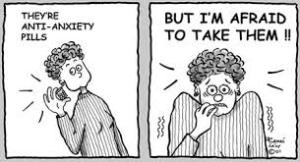Written by: Jephthah ‘Sola Iyaro and Edidiong Ekpe
 About ten years ago, lightning struck my home. It was no ordinary lightening; its aftermath was grave such that a mango tree through which it passed became barren. All electrical appliances that were plugged at the time of occurrence were damaged; electric bulbs lit and blew off at the same instant; all insulated wires, about 50 feet away, conveying electricity into the house melted away. Ever since then, whenever it’s cloudy and there are signs of rainfall, I don’t go for clothes spread outside first. Rather, I make straight for all appliances connected to the wall socket because every rainfall now seems to come along with yet another queer lightning. This feeling is called anxiety. Collins (1973) defines anxiety as the official emotion of our age, the most pervasive psychological phenomenon of our time, fully understood by no one, the central problem in understanding and treating mental illness. Anxiety could be caused by several reasons. Mine in the case I just illustrated is from experience. Sometimes, anxiety comes as we learn to think. For instance, several years ago, I would listen to the newscaster and the weather guy with interest admiring the way those English words were spoken and probably repeat after him. Now, those words make a whole lot of sense to me and sometimes news cause anxiety of some sort.
About ten years ago, lightning struck my home. It was no ordinary lightening; its aftermath was grave such that a mango tree through which it passed became barren. All electrical appliances that were plugged at the time of occurrence were damaged; electric bulbs lit and blew off at the same instant; all insulated wires, about 50 feet away, conveying electricity into the house melted away. Ever since then, whenever it’s cloudy and there are signs of rainfall, I don’t go for clothes spread outside first. Rather, I make straight for all appliances connected to the wall socket because every rainfall now seems to come along with yet another queer lightning. This feeling is called anxiety. Collins (1973) defines anxiety as the official emotion of our age, the most pervasive psychological phenomenon of our time, fully understood by no one, the central problem in understanding and treating mental illness. Anxiety could be caused by several reasons. Mine in the case I just illustrated is from experience. Sometimes, anxiety comes as we learn to think. For instance, several years ago, I would listen to the newscaster and the weather guy with interest admiring the way those English words were spoken and probably repeat after him. Now, those words make a whole lot of sense to me and sometimes news cause anxiety of some sort.
We live in an age where everything is coloured by this universal emotion. Modern technology is producing such rapid and far-reaching changes in our standards of living that some people become anxious simply trying to keep up. Also, the social media and smart phones have made it easy for us immediately to be aware of the problems that are going on in the world around us. Economy melt-down; global warming; upcoming general elections, etc. there are various reasons to be anxious and even when one tries not to be, it is most likely one ends up being anxious. Do you still remember the moment you were to check your UME result? The guy who feels apprehensive whenever he asks a girl for a date, for example, can avoid this anxiety by no dating, but then his solitary life may produce a different kind of anxiety.
Sometimes, we know exactly what gets us anxious while on other occasions we can’t pin-point the cause. You know such free-floating anxiety when you don’t know why you feel as you do. You are afraid something terrible is going to happen, but what it is or what you can do about it remains a mystery. Anxieties, people say are accompanied by physical reactions that can easily be recognized like discomfort in the stomach (“butterflies”) and so on. Okay, I know of loss of appetite, inability to sleep and some are not easily recognizable like changes in blood pressure. When these reactions persist, they may harm us. Of course persistent loss of appetite may lead to stomach ulcer, anorexia and you know the rest.
Dealing with anxiety is my major concern. One of the ways of coping with anxiety is to joke about it. Just like Basket mouth, the Nigerian comedian recently joked about Igbos getting life jackets following the threat by Oba of Lagos to throw them into the ocean if they didn’t vote for the candidate of his choice. You see, by making light of a situation we can often reduce the tensions and carry on more effectively than we might have done otherwise. Sometimes people cry about a problem and this enables them to let off steam and to feel better at least for a while. Others forget their anxiety temporarily by sleeping, day-dreaming, drowning their anxieties in alcohol and so on. The question is, are those the best solutions? While all these can lessen our feelings of anxiety, it wouldn’t be safe to think they are all equally effective. Most times, they make us shy away from the real problems. The person, who drinks, excessively, for example, may find that this helps to dull the feelings of anxiety but this is done so effectively that the cause of the anxiety may never be dealt with.
Whenever possible, it is best to face up to our anxieties and the situations which produce anxiety, and then try to do something about these problems. Psychology says that a little anxiety is a helpful thing, but the Bible says, “Have no anxiety about anything”. I think the Bible means anxiety in form of fret and worry. Instead of acknowledging God’s sovereignty, we shift the burdens of life onto ourselves and assume that we alone can handle the problems that we face. Paul could honestly write that he wasn’t anxious (that is, plagued with worry) about the possibility of being hungry, in danger, or otherwise persecuted. But he was anxious (that is, concerned) about the churches and welfare of other believers. Likewise we cannot be both committed to Christ and paralyzed by worry and fretful anxiety. But neither should we go through life with a complete lack of concern for the world around us. In all of this, we must trust in Christ to help us with the problem of anxiety as He has promised. Coming to think about it, what else could we do if not by His help?
Reference
Collins Gary, 1973: Overcoming Anxiety, Vision House Publishers, Santa Ana, California 92705, ISBN 0-87801-017-3.


so much talented
Thank you very much Emerald.
On a more serious note, the lifestyle of most if not all comes with this anxiety as an additional box in the package. The ability to do without shows transcendence which Jephthah has given a way way out in his write-up. Thumbs up bro.
– Edidiong Ekpe